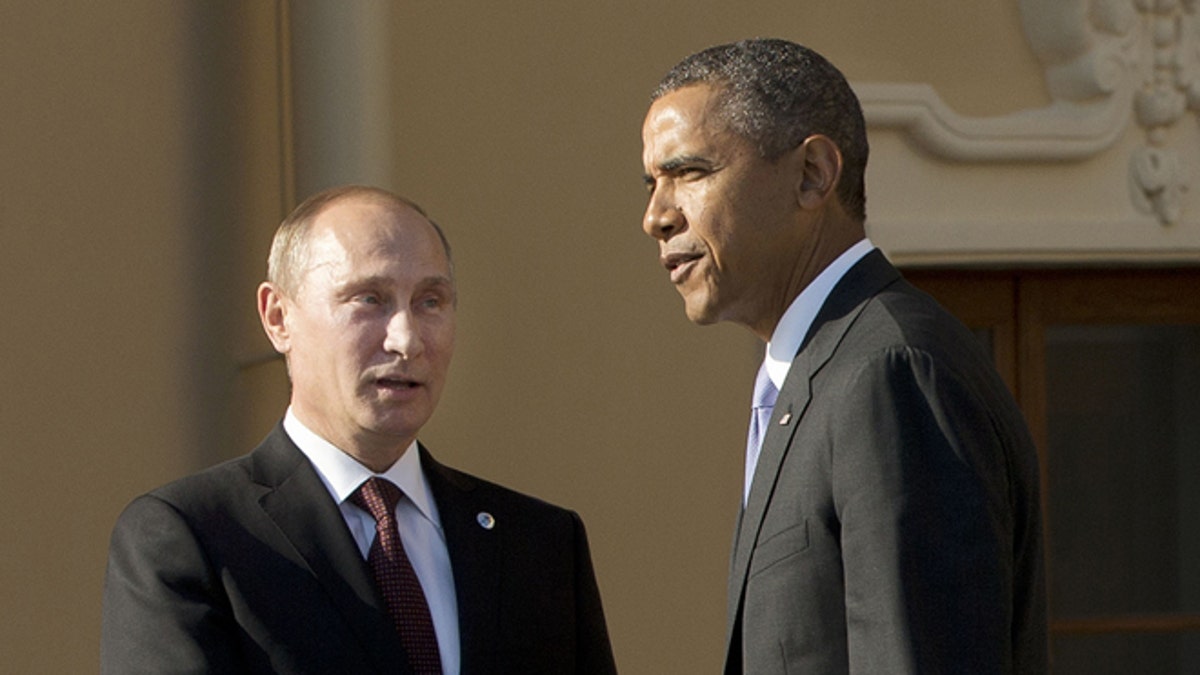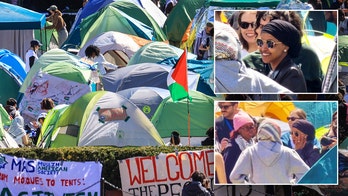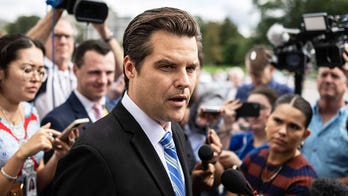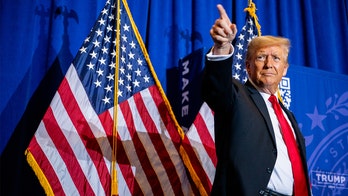
FILE: Sept. 5, 2013: President Obama shakes hands with Russian President Vladimir Putin during arrivals for the G-20 summit at the Konstantin Palace in St. Petersburg, Russia. (AP)
The tepid international support during the Group of 20 meetings for the United States' proposed military strike on Syria appears to have emboldened Russian President Vladimir Putin, who vowed continued support of Syria.
Putin said Russia will continue to supply weapons and humanitarian aid to Syria should the United States launch a punitive strike against the Middle East country for a deadly chemical weapon attack that killed more than 1,400 people.
In a statement, the European Union agreed that the Aug. 21 chemical attack outside Damascus appears to have been the work of Syrian President Bashar al-Assad but also said any potential military attack against it should wait for a U.N. inspectors' report, according to The Wall Street Journal.
"Will we continue to help Syria? We will," said Putin after a 20-minute meeting Friday with President Obama at the G-20 summit in St. Petersburg, Russia. "We're helping them now. We are supplying arms, cooperating in the economic sphere."
On Saturday, European foreign ministers endorsed a message that appears more strongly worded -- calling for a "clear and strong response" to a chemical weapons attack that strongly points to the Syrian government. But they also urged the U.S. to delay possible military action until U.N. inspectors report their findings.
The agreement was reached during a meeting in Lithuania of the European Union.
Secretary of State John Kerry, trying to make the Obama administration's case for a strike, thanked the countries for a "strong statement about the need for accountability."
"This is not the time to be silent spectators to slaughter," Kerry said at a news conference in Paris with French Foreign Minister Laurent Fabius. “This is not the time to allow a dictator unfettered use of some of the most heinous weapons on earth."
Putin, one of al-Assad’s closest allied in his country’s roughly 2-year-long civil war, said he and Obama had a “very meaningful, constructive and friendly conversation.”
However, he said, they came no closer to an agreement on Syria or that Syrian rebels were responsible for the sarin-gas attack that killed hundreds of women and children.
"I don't agree with [Obama’s] arguments, and he doesn't agree with mine," said Putin, according to The Journal.
Spain and nine permanent G-20 countries joined the U.S. in signing the first statement, which calls for a strong international response against the Assad regime.
However, 10 other nations declined to sign the statement.
On Friday, Putin publically pointed out that Russian and seven other G-20 countries were "categorically against" military action in Syria, as are Pope Francis and U.N. Secretary General Ban Ki-moon.
He also noted earlier in the week that the British Parliament rejected Prime Minister David Cameron’s call of military action.
“There are people who value their sovereignty, analyze the situation and have the courage to make decisions for the benefit of their own countries." Putin said. "It is a very good sign. It shows that the multi-polar world order has indeed been strengthened."
Obama has asked Congress to approve the use of force. A final vote in the Senate is expected at the end of the coming week. A House vote is likely the week of Sept. 16.
The Associated Press contributed to this report.




